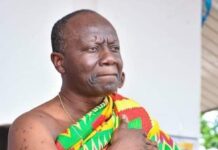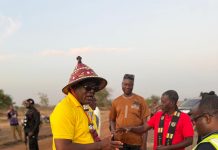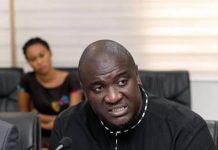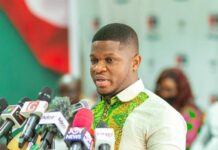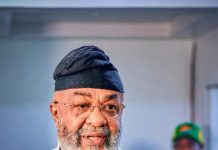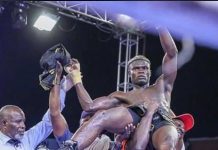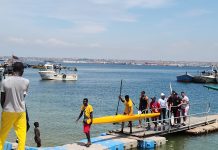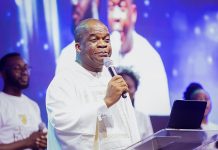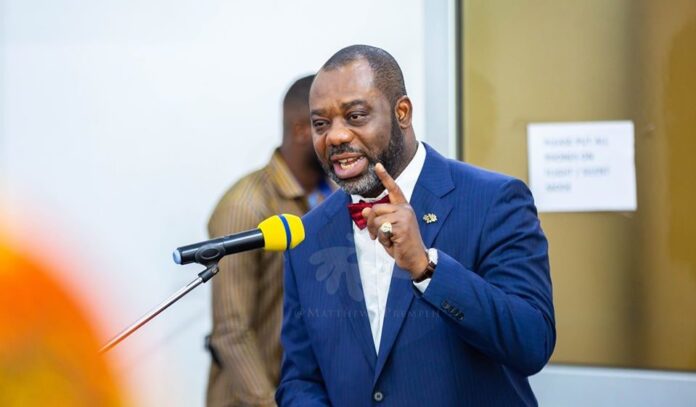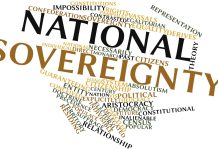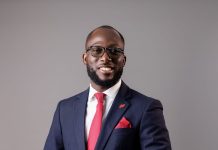JOHANNESBURG, South Africa, October 2021/ — The African Energy Chamber (AEC) has launched its highly anticipated annual outlook, ‘the State of African Energy 2022,’ outlining the continent’s sector and providing insight into the various challenges and opportunities the continent has and continues to face. In the report, the Chamber identifies and celebrates Africa’s top 25 movers and shakers for 2022, drawing attention to influential individuals who are expected to shape Africa’s energy sector in 2022 and beyond.
H.E. Dr. Matthew Opoku
H.E. Dr Opoku oversees an industry which, despite its shortcomings, is considered to be one of the most advanced on the continent, driven by a clear framework that allows for investors and service companies to operate seamlessly, and without impairing the benefits that accrue to Ghanaians. Compared to its peers, most of whom are producers with a longer history in the industry, Ghana has been able to promote strong, progressive local content regulations. Dr Opuku is expected to continue in the same vein in 2022, promoting initiatives like gas to power and advocating for a stronger participation of women in the industry. He is also expected to be a strong voice on eradicating energy poverty by 2030 in Africa as he champions the electrification of Ghana through a multitude of initiatives spearheaded by his ministry.
H.E. Macky Sall, President of the Republic of Senegal
As in-coming African Union Chair, H.E. President Macky Sall, who previously served as Managing Director of Petrosen and Minister of Petroleum and Energies, will be seen as a rational and conciliatory voice for the battle on fossil fuels between Africa and the developed world.
Domestically, and despite the global call for fossil fuel abandonment, the push for first oil at the Woodside operated Sangomar development with BP continues to be on every industry player’s radar, especially given the proximity of the projects to developed western markets. How the President navigates issues of fossil fuel developments in an energy transition context will be observed by the rest of the continent, particularly as project success opens the MSGBC basin up to further investment.
Hon. Gwede Mantashe, Minister of Mineral Resources and Energy, South Africa
Hon. Minister Mantashe has been laser focused on creating the right legal framework for South Africa’s offshore gas resources to be monetised and developed in order to provide much needed energy feedstock for power generation. TotalEnergies discovered significant quantities of gas in February 2019, and in 2022, we expect Hon. Minister Mantashe to finalise the long-awaited new oil and gas law that will give clarity to investors, pushing it through parliament and getting it signed into law. We also expect him to finalize the ongoing restructuring of oil and gas state owned enterprises in the oil and gas sector, making them more efficient and profitable entities going forward. Hon. Minister Mantashe is likely to strengthen his advocacy for positioning South Africa as a major gas player in 2022. He is also a voice of reason on climate concerns around decarbonization. Additionally, Hon. Minister Mantashe is also in charge of developing South Africa’s capacity to increase value creation from battery minerals, which will only grow in importance as demand for batteries increases globally.
Hu Xiaolian, Chairman, Export-Import Bank of China
Chinese lending to Africa, including those directed towards African related energy projects, continues to be on the decline since its peak in 2013. However, China’s Export-Import Bank (Eximbank) continues to be the single largest lender or underwriter of debt to Africa, in line with the Chinese government’s long-term initiatives. Loans to African projects from China’s Eximbank continue to be cost competitive and therefore attractive.
However, they are increasingly only available to commercially viable projects with Chinese involvement. China Eximbank is also a major provider of credit lines to African infrastructure focused lenders like the Afreximbank and the African Finance Corporation. Backed by over USD800 billion in assets, Ms Hu Xiaolian is expected to wield significant influence in Africa’s energy sector in 2022, deciding on the financing and refinancing of multibillion dollar deals in Africa, from strategic mineral projects in the Democratic Republic of the Congo and Zambia, to oil backed loans in Angola and hydropower projects in Nigeria.
Patrick Pouyanné, CEO, TotalEnergies
TotalEnergies’ likely resumption of its multibillion-dollar Liquified Natural Gas (LNG) project offshore Mozambique in Q1 2022 puts Mr Pouyanné in charge of arguably the most important energy project on the continent this decade. TotalEnergies Mozambique LNG project is expected to attract USD$20 billion in investment, leading to multiple years of double-digit growth for Mozambique once completed. TotalEnergies continues to hold the largest individual share of oil and gas resources in Africa. Following recent project success such as the completion of the Egina project in Nigeria, the energy major is flexing its muscles by lining up additional ventures for 2021 in Nigeria, Angola, and Uganda. Developing and operating these assets in 2022, in addition to other sizeable projects including the development of OML99 Block in Nigeria – expected to produce 60,000 bpd -; and deploying USD $1.2 billion to develop Zinia 2 in Angola’s block 17, will make Patrick Pouyanné yet again the most active International Oil Company CEO in Africa in 2022.
Tony Elumelu, Chairman, Heirs Holdings
Mr. Elumelu’s company Heirs Holding is likely to solidify its position as a rising star amongst African energy sector players, as the company puts into action plans to increase the output of its recently purchased OML 17 asset – which currently produces 27,000 bopd. The market is watching Heirs Holding to see if it will be successful in operating such an asset. Upon success, it is very likely that this will not be the last deal Heirs Holdings acquires from divesting IOCs, emphasizing the role of domestic companies in Africa’s hydrocarbon future. Additionally, Mr Elumelu’s control over the 2,000 MW of installed power capacity in Nigeria – via recent acquisitions – also makes him a force to reckoned with in the power space, not only in Nigeria, but also in the entire region where the demand for power continues to grow.
André de Ruyter, CEO, Eskom
Mr. de Ruyter currently heads the largest utility company in both the country and the entire African continent. As one of the top ten global emitters of carbon, Eskom has set an ambitious target of ending coal-fired power generation by 2050 – despite the fact that 90% of the country’s power generation comes from coal. In 2022, Eskom, led by Mr. de Ruyter, will see an accelerated shift from coal to renewable energy resources, with the company currently in the market to secure USD$10 billion as part of a multibillion-dollar energy transition investment plan. With South Africa’s current power demand exceeding supply, the transition could unlock much-needed power generation capacity, strengthening energy security as the economy recovers from the COVID-19 pandemic. Given the strategic importance of Eskom to South Africa and to the entire Southern African Power Pool, the energy sector will be watching Mr de Ruyter’s stewardship of Eskom to assess the true viability of energy transition plans in Africa.
H.E. Mohammed Barkindo, Secretary-General, OPEC
H.E. Mohammed Barkindo might have left Africa for the world stage when he joined OPEC in 2016, however he continues to be a flag bearer for the industry in Africa. OPEC, under H.E. Barkindo, has seen African countries like Equatorial Guinea and the Republic of Congo join the exclusive club, giving those countries access to the organisations clout and technical know-how that is key for running their oil sectors. OPEC is scheduled to increase its activities on the continent in 2022 with an array of roadshows, technical workshops and meetings that are set to also include non-OPEC oil producers. This will make H.E. Barkindo the go-to person in 2022 for most ministers and presidents on the continent as they seek enhanced public policy advise on the sector.
H.E. Bruno Jean-Richard Itoua, Minister of Hydrocarbons, Republic of the Congo
The Congo will take over the Organization of the Petroleum Exporting Countries (OPEC’s) rotating presidency in 2022, giving H.E. Minister Itoua a key role in coordinating the activities of the world’s major oil producers. An astute politician, with extensive experience in the energy sector both regionally and internationally, H.E. Minister Itoua is likely to seek consensus that will keep production increases and restrictions coordinated in a manner that keeps markets, and ultimately prices, stable. It is likely that he will seek to strengthen cooperation between African OPEC and non-OPEC producers in an effort to keep prices upwards of USD 60 dollars per barrel. Internally, stakeholders expect H.E. Minister Itoua to continue on a path of reform to increase investment into Congo’s oil and gas sector, particularly in light of proposed divestments from IOCs.
Claudio Descalzi, CEO, ENI
ENI’s recent discovery offshore Côte d’Ivoire – estimated to be approximately 2 billion barrels of oil and 2.4 trillion cubic feet of gas – emphasizes the company’s commitment to being one of the most active IOCs on the continent, despite an overall reduction in exploration activity across Africa. Mergers & Acquisitions activity and additional field developments in Angola and Nigeria are likely to increase its portfolio, rather than reduce it as is the case with other IOCs. ENI has also announced that it is on track to start the production and exportation of gas from its USD$7 billion Rovoma LNG project offshore Mozambique. This will be the first step in Mozambique’s path to become a major LNG exporter, further positioning the company as Africa’s top exploration and production player.
H.E. Gabriel Mbaga Obiang Lima, Minister of Mines and Hydrocarbons, Equatorial
H.E. Minister Gabriel Mbaga Obiang Lima heads the sector of one of Africa’s OPEC members. Credited with leading the industry in Africa on many fronts, he will be judged in 2022 on his ability to bring in policies that will see Equatorial Guinea attract new entrants into its prolific waters for new exploration and development projects.
A strong proponent of the monetisation of gas in Africa, it is expected that H.E. Minister Lima will expand the network of his LNG2Africa initiative in order to bring more countries and organisations on board, creating a natural gas market for Equatoguinean reserves. Many eyes will be set on the minister to see how he will manage the exit of IOCs from his country. His actions are likely to serve as a blueprint for many other regulators seeking to manage the exit of IOCs on the continent.
Fleetwood Grobler, CEO, SASOL
South Africa’s government has turned to the Johannesburg-based petrochemical giant to lead its efforts towards a hydrogen economy in South Africa. Backed by numerous Memorandums of Understandings with state backed enterprises and local governments, all of which are professing their availability as off takers of hydrogen within the power generation space, Sasol is expected to invest millions of USD in feasibility studies in 2022 to develop a business plan for hydrogen in Africa. If successful, this will define the age of hydrogen-powered energy on the continent for decades to come.
H.E. Chief Timipre Sylva
H.E. Minister Sylva is credited with achieving the passing of the long-awaited Petroleum Industry Bill (PIB) in Nigeria, which broadly improves the operating environment in the industry, unlocking billions of dollars for energy projects. H.E. Minister Sylva’s challenge now remains to guide the implementation of the PIB in 2022 in order to fast track those projects that are already shovel ready. H.E. Minister Sylva is also expected to use his influence in 2022 to push for the creation of an African energy bank, one that will be able to provide the much-needed financing for energy projects both in Nigeria, and across the entire continent.
Sebastião Gasper Martins, CEO, Sonangol
Since his appointment in 2019 to lead Africa’s second largest crude producer and Angola’s NOC, Mr. Gaspar Martins has been in charge of Sonangol’s restructuring, which has consisted primarily of reducing the company’s exposure to non-ore E&P functions in order to focus on exploration and production. In 2022, Mr. Gaspar Martins will be leading Sonangol to the market in order to refinance significant amounts of debt and raise fresh funds for new E&P projects, as the company seeks to address production declines below current levels of 1,1 million barrels of oil per day.
Rolake Akinkugbe-Filani
An astute energy banker and current Chief Commercial Officer at Mixta Africa – one of Africa’s leading infrastructure developers – Ms Akinkugbe-Filani is both an authority and well sought-after counselor on energy transition in Africa. As a trusted advisor to Development Finance Institutions – who play an important role in financing green energy projects in Africa – Ms. Akinkugbe-Filani’s voice of influence will be exceptionally prominent in Africa’s energy industry in 2022. Meanwhile, Ms. Akinkugbe-Filani sits on the board of several funds, including Africa-focused climate and renewable energy fund Persistent which runs a $120mn Energy Fund.
Mustafa Sanalla, Chairman, Libya National Oil Corporation
Libya’s all-important oil sector has struggled to maintain previous levels of production and attract the investment that a 1.3 million bpd economy would usually command. Current levels stand at under 800,000 barrels per day. However, plans by Mustafa Sanalla, Chairman of Libya’s National Oil Company, to ramp up production in the near term to over 1 million barrels per day in 2022 make him one of the most important figures in the industry in 2022 and beyond. Seen as a steady hand even in times of turmoil, it is unlikely that Mr Sanalla will leave his position, no matter who wins the presidential and parliamentary elections scheduled for December 2022.
Proscovia Nabbanja, CEO, Uganda National Oil Company
As CEO of Uganda’s National Oil Company (UNOC), Ms. Nabbanja oversees the company, which is involved in and has the power to influence every step of the development of Uganda’s nascent oil and gas sector. From the Tilenga and Kingfisher South projects, which together are expected at peak to produce 210,000 barrels per day, to the building of the EACOP pipeline and a planned 60,000 barrel per day refinery, UNOC is set to be at the heart of major investments in East Africa. Ms. Nabbanja will be tested on her ability to represent the state in the Joint Venture with IOCs to ensure that developments are fast tracked, whilst at the same time safeguarding the interests of the Ugandan state. Overall, investments needed to develop the Ugandan projects are expected to exceed USD 10bn over the next decade.
Vivienne Yeda, Chairman/Director General, Kenya Power/East African Development Bank
As head of the East African Development Bank’s management team and Chairman of Kenya’s power distributor, Ms. Yeda is at the center of the restructuring of Kenya’s power sector. She was nominated to the Kenya Power Chairmanship in November 2020, with the brief to steer the restructuring of the troubled state enterprise. Her extensive experience at the regional development financing institution also gives her a prime seat at the table when decisions are being made regarding financing energy deals in the region.
Maj Gen Innocent Kabandana, Commander of Rwandan Troops in Mozambique, Rwanda
Can the joint task force commander of Rwandan troops in Mozambique’s northernmost province of Cabo Delgado quickly stabilize the area and pave the way for TotalEnergies to deliver on Mozambique LNG? That is the question which is on the mind of everyday Mozambicans and Africa at large. The gas projects off the coast of Cabo Delgado are of critical importance, not only to Mozambique, but to the entire region. It is very likely that Gen Kabandana and his men, as well as other forces from the SADC region who are in the country, will provide the necessary security for TotalEnergies and other contractors working on gas projects in 2022.
Maixent Raoul Ominga, CEO SNPC
Mr Ominga is head of the Republic of Congo’s NOC, SNPC. In this position, he is expected to play a major role in the reallocation of assets in the country dropped by IOCs as they rebalance their portfolios. It is likely that some of these assets will be passed on to the SNPC to operate, hence raising SNPC’s profile as an operator. This will also give Mr. Ominga significant leverage to transform the industry in the Congo, by using his increasing influence to expand Congolese capacity and government off-take from production.
Toufik Hakkar, CEO, Sonatrach
As head of Algeria’s national oil company – which is also one of the world’s largest gas producers’ – Mr Hakkar, a Sonatrach veteran prior to his appointment in February 2020, shall play a major role in the sanctioning of new gas projects in Algeria in 2022. This will be particularly important considering the recent increase in demand for gas globally and the resulting price increases. Given the position Sonatrach takes in the market, Mr Hakkar will be in charge of sanctioning services contracts in the industry in 2022 worth more than USD10bn, therefore, giving him a key role in the industry in Africa in 2022.
Dr. KK Sarpong, CEO, GNPC
An agreement by GNPC and Kosmos Energy to buy out Occidental energy’s share of the Jubilee and TEN fields in Ghana strengthen GNPC’s position in the sector and shows that the NOC is willing to put skin in the game and build capacity to take on projects of their own in the near future. It also shows that GNPC, under Dr Sarpong, is a deal maker and capable of making the tough calls needed to build GNPC’s productive asset base. As oil prices stay at relatively high levels, it is likely that we will see GNPC embark on several projects in 2022 that will also help increase overall Ghanian capacity in the sector.
Olakunle Olalekan Williams, CEO, QSL Gas & Power Ltd.
Nigeria, and Africa as a whole, are betting big on gas to power to drive socio-economic growth and energy security. QSL Gas and Power Limited and its CEO Mr. Williams, have positioned themselves as facilitators of this growth by establishing themselves in a relatively short time as registered and reliable suppliers of gas to industrial complexes and power stations. Mr Williams has led the company to develop a combined supply and trading capacity of over 120mcf of gas daily. The company plans to increase this figure significantly by developing the infrastructure needed to get off- grid energy users connected to their supplies. This will not only give QSL-GP a strong market position in 2022, but will enable the company to raise the funds, or at least part of them, for a continent-wide expansion.
Scot Evans, CEO ReconAfrica
As head of the Africa-focused oil and gas explorer in a basin that has demonstrated much potential that is yet to be confirmed, questions are being asked if Mr. Evans and his team can meet expectations. So far, initial evaluations from early exploration work has been positive. However, can he maintain a thick skin amidst a radical onslaught by activists in his quest to deliver Namibia an oil promise? The Canadian-based independent has emerged as a major exploration player, particularly in frontier markets such as Namibia and Botswana. Just this year, the company’s exploratory drilling in the Kavango Basin revealed a working petroleum system, positioning both the country as an attractive hydrocarbon market and ReconAFRICA as a key player. 2022 will be a year of reckoning for ReconAFRICA as it realizes its ambitions.
Ann Norman, President, Saqara Energy
As President of SAQARA Energy, Ms. Norman’s primary goal is to assist oil and gas companies eliminate and monetize their associated gas flares through the advent and introduction of Midstream on Demand to African markets. The lack of midstream options for the offtake of products has led her to found Midstream Africa. Ms. Norman has significant experience in directing investments into sub-Saharan African economies across various sectors, including not only oil and gas (midstream and upstream), but agriculture, infrastructure, banking, hotels, the airline industry and renewable energy. With the increase of gas to power infrastructure in Nigeria and across the continent, Ms. Norman is set to play a key role in 2022 in helping many small- and mid-sized producers in Nigeria and beyond monetize their gas.
Ahead of the continent’s premier energy event, African Energy Week (AEW) 2021, the top 25 movers and shakers list celebrates the progress made by dedicated individuals across the continent. AEW 2021, in partnership with South Africa’s Department of Mineral Resources and Energy DMRE, is the AEC’s annual conference, exhibition and networking event. AEW 2021 unites African energy stakeholders with investors and international partners to drive industry growth and development and promote Africa as the destination for energy investments.
For more information about Africa’s premier energy event, please visit www.aew2021.com or www.energychamber.org and/or reach out directly to Amina Williams at amina.williams@energychamber.org
Distributed by APO Group on behalf of African Energy Chamber.



